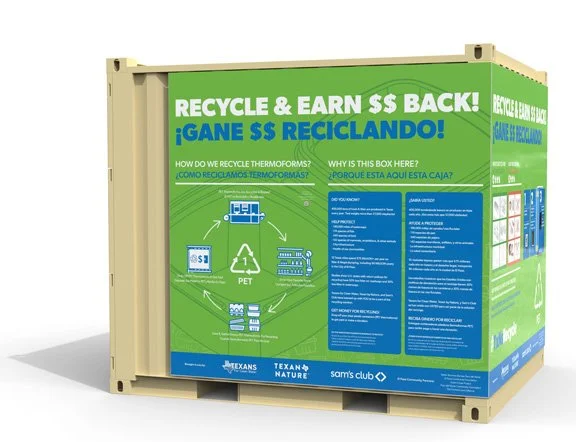
Circular Packaging & Waste
BlueTriton Brands' strategy for circular packaging and waste involves sustainable packaging design, incorporating recycled materials, and establishing effective recycling systems. Additionally, we also prioritize waste reduction and consumer education to promote a circular economy and minimize environmental impact.
Goals*:
By year-end 2025, aim for 100% of beverage packaging to be reusable or made from an average of 35% recycled material
By 2030, aim for 100% of beverage packaging to be recyclable, reusable and/or compostable
By 2030, aim for beverage packaging to be made from an average of 50% recycled or renewable material
Check our progress here
Learn More About Our Projects & Partnerships
More Accessible Recycling
Funding Support to Expand Plastic Bottle Recycling Project
BlueTriton Brands is proud to partner with Replenysh, a community-powered collection network, to expand an existing plastic bottle recycling project in Jackson, Mississippi. Funding supported more recycling locations throughout the City to accept PET #1 plastic bottles.
Take the MadeBetter Pledge
Brings Bottles Full Circle With Made For A Better Tomorrow Campaign
BlueTriton’s Made For A Better Tomorrow campaign highlights the industry-leading efforts to create new bottles from existing materials and establishes a new ‘One-for-One Promise’ that commits to donate bottled water to communities in need for every pledge to recycle.
Incentivized Recycling Pilot
Incentivized, Source-Separated Recycling in El Paso, Texas
BlueTriton is proud to partner with Texan by Nature and Texans for Clean Water on an El Paso-based recycling pilot program in an effort to reduce plastics in waterways, roadways, and in landfills. The pilot project provided 670,000 El Paso residents with cash incentives to recycle PET #1 bottles and PET #1 thermoform plastics.
Policy Position Paper
Evolving Deposit Return Systems for Consumers & Producer Responsibility
In 2022, BlueTriton undertook efforts to better understand best-in-class deposit return systems in a pursuit of being a transparent and constructive partner in developing future policy. These efforts culminated in a 2023 release of BlueTriton’s position on DRS policy.
Efforts to recycle plastic
In 2018, approximately 29.1% of PET bottles & jars were recycled across the United States. Recycling rates of PET vary across regions and recycling programs with bottle deposit return systems achieving the highest recycling rates up to 2.5 times the national average. Existing forms of mechanical recycling diminish the quality of plastic with each recycling attempt, although work is being done to try to find ways in which recycling might restore this quality.
Footnotes:
Our commitments, targets, aims and goals may change over time for many reasons such as evolving and changing nature of, or availability of, standards, changes to business as well as changes in business priorities and stakeholder significance, new industry practices, technology or science, or changes to law or regulatory guidance. Overall, historical, current, and forward-looking Sustainability-related (including sustainability-related) statements may be based on standards that are still developing or may be revoked, internal controls and processes that continue to evolve, and assumptions that are subject to change in the future, such as unexpected delays, difficulties, and expenses in executing against, or changes in laws, enforcement, investor sentiment or demands, or litigation, relating to or otherwise affecting our execution of, the goals included on this webpage. The information and opinions contained on this webpage are subject to change without notice. BlueTriton Brands Inc. does not undertake to update or revise any of the statements or goals contained on this webpage.
"Packaging". In our 2025 goal, "packaging" refers to the primary packaging that contains a beverage product (e.g., bottle & cap), excluding secondary and tertiary packaging (e.g., trays, labels, pallets, etc.). In our 2030 goals, "packaging" refers to all packaging materials utilized in the saleable beverage product or during transportation & distribution (bottle, cap, label, tray, films, pallets).
"Reusable" refers to any beverage packaging which is designed to be collected and used multiple times for its original intended purpose by, or on behalf of, BlueTriton (e.g. 5-gallon bottles which are designed to be collected, sanitized, and refilled, or pallets which are designed to collected and redistributed). In our 2025 goal, "reusable packaging" refers only to the 3-gallon and 5-gallon bottles sold by ReadyRefresh®.
"Recyclable" is defined under relevant or select applicable law or regulation. Materials are recyclable only where recycling facilities exist. Recycling facilities may not exist in your area, and BlueTriton does not take any steps to verify whether recycling facilities exist in your area or that existing facilities are able to or in fact process recyclable materials.
"Compostable" refers to beverage packaging which is in compliance with ASTM standards, such as, ASTM D-6400 and ASTM 6868 (coatings), ISO 18606.
"Renewable material", as defined by GRI, is continually replenished at a rate equal to or greater than the rate of depletion and includes materials sourced from suppliers certified for sustainable resource management standards, such as, standards from Sustainable Forestry Initiative (SFI) or Forestry Stewardship Council (FSC).






